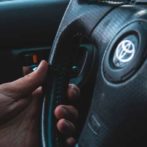Snapshots of Dementia: It’s the Little Things
Photo by Danielle Rice on Unsplash Over the past several months of my somewhat irregular “snapshots of dementia” posts, I’ve written about lots of big things. Our painful journey toward diagnosis. Job losses. Wounds to our marriage and our family. Asking Tom to stop driving. And more. But I’ve also noticed that with dementia as with many areas of life, the little things often have just as much impact as the large ones. Consider the following as not a list of my favorite things but rather of the little things that touch my heart as I watch his early-onset dementia, frontotemporal degeneration, steal so much from my husband. — Open Doors: Tom’s short-term memory has become so short that he rarely remembers to close doors or drawers. You may recall that much earlier, we had to put special hinges on our front door to close it automatically because more than once, he left it standing open when he left for work. Now I can trace his path through our home by the doors and drawers he leaves open. Praise God for a refrigerator with an alarm! — Press Pause: Sometimes I find Tom standing in our hallway, a blank look on his face. Although it passes quickly, I know this means he’s started to go somewhere or do something and forgotten what he started out to do. I can hear some of you saying, “But I do that all the time.” Yes, but probably not fifteen or more times a day—and within only a few seconds of starting the activity. — Delayed Departure: My experience as the mother of five has prepared me well for my current stage of life. As a mom, I had to plan to leave 10 or 15 minutes earlier than the actual departure time because someone wouldn’t have their shoes on or another would need to make a bathroom stop. Even if I tell Tom, “We have to leave in a few minutes,” his broken brain can’t translate that to the steps he must take to be ready to go. In fact, if I give him only two things to do, he will usually forget one of them. These days, we exit more slowly and often have to make a trip or two back inside before our true departure. — “You’re So Smart”: Tom often makes this comment multiple times a day. “You’re so smart” because I could log onto the library website. “You’re so smart” because I knew how to install an app on my phone. “You’re so smart” because I remembered what I had planned for the weekend. What touches my heart here? He never used to say, “You’re so smart” because...
Read More






